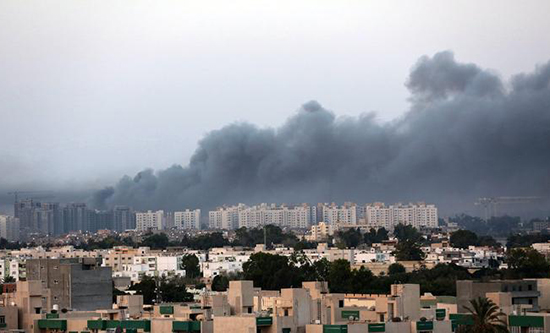
As Libya heads towards a decade of virtual statelessness, anarchy and humanitarian catastrophe in the wake of the imperialist war of 2011, European leaders have convened a series of emergency summits to try and resolve the crisis. With UNICEF warning of a ‘dire and untenable situation’, there has been no let-up in the fratricidal war between two rival governments representing external interests. Mercenaries are flooding the country while imperialist and regional reactionary politicians stake their claims to prop up their own version of a neo-colonial regime. Ordinary Libyans and African migrants are paying the harshest price for the destruction of the Libyan state.
Beginning the latest round of talks on 20 January, politicians met in Berlin for an EU-led Libya summit, where world leaders committed to ending ‘interference in the armed conflict or in the internal affairs of Libya’. They promised to ‘respect and implement’ the arms embargo on Libya imposed by the UN in 2011 but frequently violated and called for a ceasefire, the dissolving of militias and for Libyan parties to enable ‘transition’ by resuming the ‘political process’. As an afterthought, they pledged to support an ‘end to the practice of arbitrary detention’, urging the Libyan authorities to ‘gradually close the detention centres for migrants and asylum seekers.’
This apparent unity of EU, US, British, Russian, Turkish and other states belied the deep divisions at the heart of an armed confrontation in which the leaders back opposing sides. It also masked the slavery conditions that European migration policy have created in Libya. A follow-up Munich Security Conference on 16 February was equally meaningless. EU states are divided in support for the UN-recognised lame duck Tripoli government of Fayez al-Sarraj and the advancing Libyan National Army (LNA) of rogue general Khalifa Haftar.
At the 16 February event, EU foreign policy chief Josep Borrell complained about the passivity of EU foreign policy, admitting that ‘Europe needs to develop an appetite for power’. It should be remembered that French military provided cover for the killing of former Libyan leader Muammar al-Gaddafi in October 2011 and that European imperialist ‘power’ has been at the heart of Libya’s destruction for a decade. However, Borrell’s words also mask deeper divisions in the EU. The Sarraj government in Tripoli is backed by Italy, Britain, Turkey and Qatar. LNA supporters include France, Jordan, Russia, Egypt, Saudi Arabia the UAE; Haftar has also voiced a willingness to normalise ties with Israel. The US Trump regime has played an ambivalent role, nominally supporting talks but maintaining contact with LNA representatives and criticising Turkey’s pro-Sarraj intervention.
Exposing both the toothlessness of negotiations and the intensification of competing interests, there are signs that shipments of weapons to both sides in the Libyan war have actually boomed since the Berlin summit in January. Flight tracking data published by Guardian correspondents on 11 March show that the UAE had made more than 100 arms deliveries since mid-January, some directly via its own air routes and others via its base in Eritrea; the Jordanian airport of Aqaba is also a key link in this supply chain. Arms to Sarraj forces have been shipped by Turkey via Lebanon; when one shipment was intercepted in Genoa on 20 February, its crew claimed that the planned stop in Tripoli was due to a mechanical failure. EU agreements to deploy warships in the Mediterranean and monitor weapons imports by satellite amount to little.
A crucial component of these events is the military intervention of the Turkish junta of Recep Tayyip Erdogan from 6 January. Fighting a reactionary war on two fronts, Turkey has sent 4,000 mercenaries from the Syrian National Army/Ahrar al-Sharqiya; part of the Turkish invasion of northern Syria, the organisation is responsible for the torture and murder of civilians and progressive activists, including Syrian-Kurdish politician Hevrin Khalaf and her bodyguard in October 2019. (Amnesty, 18 October 2019) Thousands of Sudanese militia fighters have been reportedly drafted in to Haftar’s armies in Eastern Libya.
The Turkish vote for military intervention came on the same day that Israel, Cyprus and Greece signed a new pipeline deal to transport natural gas from to the eastern Mediterranean to markets in Europe. All three condemned Turkey’s intervention, as did Egypt. One of Ottoman Turkey’s last two colonial possessions (the other was Qatar), Libya is seen by Erdogan as a key sphere of influence and a potential maritime border, allowing Turkey to face down the competing threat of Israel, Greece, Egypt and Cyprus. Saudi Arabia, which has itself sent arms and ideological support to the LNA, condemned the Turkish operation as ‘bringing more instability’.
Trapped in the vice of belligerent military rivalries and with no significant force existing to represent their interests, the Libyan masses face catastrophe. A January 2020 report from head of UNICEF Henrietta Fore warned that ‘children in Libya are in a dire and untenable situation that the rest of the world should find unacceptable’. Children are being maimed, killed and recruited to fight; 150,000 people were internally displaced in the eight months to January, including 90,000 children; 200,000 were unable to attend school; 13 healthcare facilities were forced to close. There is no sign that the emergence of slavery in Libya, first reported in 2017, has been curbed. 85% of African migrants arriving in Italy from Libya report being subjected to torture. According to Doctors for Human Rights, Libya’s ‘large system of exploitation of migrants and refugees [is] one of the main sources of income; a country where crimes against humanity are committed in a systematic way.’ (20 March 2020)
Before the NATO invasion of March 2011 Libya had, under the Gaddafi government, the fifth highest per capita income in Africa. After Gaddafi’s murder the BBC looked back on ‘what may have been North Africa’s most totalitarian, arbitrary and brutal regime.’ (Kafala, 20 October 2011) In six years, Libyans’ per capita income fell seven places. Neither side in this imperialist-fuelled tragedy can offer them a way out.
Louis Brehony




